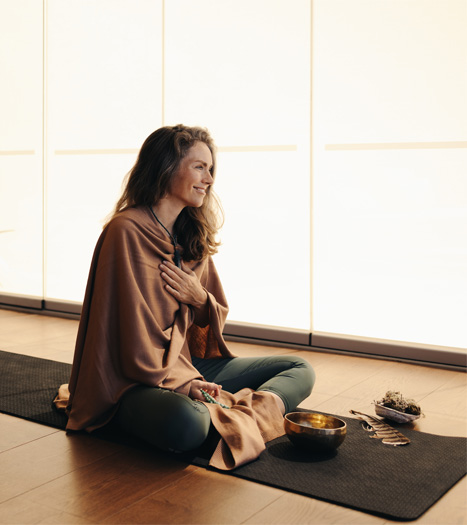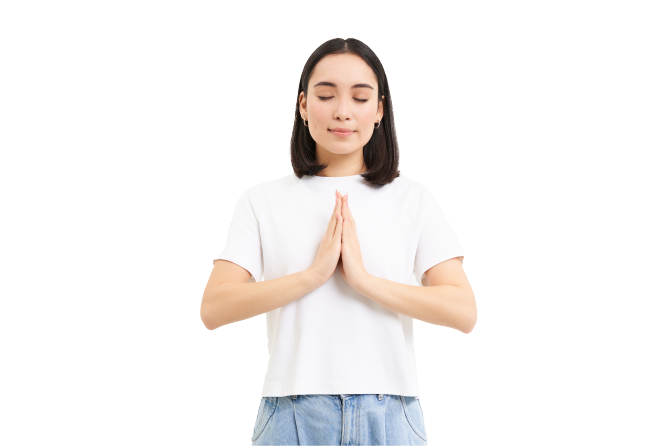What is Ayurveda ?
Ayurveda (आयुर्वॆद in Sanskrit*) is undoubtedly the oldest health system in the world. This medicine from the Indian subcontinent, dating back nearly 5,000 years, goes beyond therapeutic functions, highlighting the symbiosis of our health balance with the universe in which we live. Ayurveda, as an art of living, calls us to be actors of our health. The fulfillment of the Being is at the heart of its definition, "Ayur" meaning Life and "Veda" Knowledge.
Ayurveda links the physical, the psychic and the metaphysical, it seeks to balance the body and the spirit of each individual according to the differences constituting it. The oldest books were written nearly 3,000 years ago and yet they seem to have been designed to address the concerns of 21st century women and men.
The current form of Ayurveda results from deductions based on fundamental concepts, and the conclusions of experiments proven over centuries.
A practical, concrete, and common-sense method, Ayurveda is based on the balance of the fundamental biological functions called the Doshas, the good digestive and metabolic processes (Agni), the good construction of body tissues (Dhatus), the process of natural excretions (Malas) and the harmonious coordination of the senses (Indriya), mind (Manas) and consciousness (ātmā).

By clearly identifying the composition of one's personal nature, one can assess one's needs to rebalance one's physical and psychological health. Diet, herbs, oils, massage, yoga, and meditation are the most natural ways to maintain balance.
* language spoken in ancient India
The main ayurvedic principles
The 5 elements in Ayurveda
According to Ayurveda, all physical creation in the universe is composed of the 5 Primary Elements (Pancha-Mahabhutas): Ether (or space), Air, Fire, Water and Earth.
Each of these 5 Primary Elements is present in varying proportions allowing very different qualities of each material created. It is this variety of qualities and proportions that create an extraordinary diversity of life. As these 5 elements are constantly changing and interacting, altering one of them leads to the modification of all the others. In this, it comes close to the definition of the states of matter of our modern chemistry.
- ETHER “Akasha” is the most subtle manifestation. It is equated with expanse or space, which allows the existence of elements and materials.
- AIR “Vayu” is the gaseous state. It is light, clear, dry and allows movement.
- FIRE “Agni” is the power of change and transformation. It has qualities of heat and allows the mutation of the elements.
- WATER “Apas” is the liquid state. It allows other elements to associate.
- EARTH "Prithvi" is the most solid form, with the qualities of stability. It allows the elements to have a density.
The principles of the Pancha-Mahabhutas apply throughout the physical universe, including the human body where they obviously take on a more subtle and biological form. For example, the Fire element will be present through stomach acids or hormones.
What is your dosha ?
Three vital energies group together all the elements of an individual's constitution: these are the three doshas. These doshas are known by their Sanskrit names: Vâta, Pitta and Kâpha. To learn more about the doshas, read the article dedicated to the doshas.
Ayurveda in the West and its benefits

Ayurveda is a great tool for the modern man and woman whose existence is often lived at a rhythm of permanent stress, consuming food poor in nutrients and evolving in a denatured environment. Our health balance is affected by our way of life and Ayurveda allows us to find harmony and serenity.
Also, philosophy and art of living, Ayurveda seeks above all to prevent any disease by rebalancing the 3 doshas, a term that can be translated as “what changes”. Each of us is in balance and we always evolve, according to our age, our psyche, our environment, our entourage or our professional situation. For these reasons, the Ayurvedic doctor or therapist takes into consideration above all our deep nature. For him, everyone is an enigma that he must solve in order to restore and then maintain the balance essential to our physical and mental health.
We are here in a logic of medicine of the person and a wisdom of the living. This is why Ayurveda is a discipline that agrees with modern constructive thought. Nowadays, Ayurveda is recognized by the largest institutions such as the World Health Organization, AYUSH (Indian Ministry of Health), EUROCAM (European Foundation for Complementary and Alternative Medicine). It arouses keen curiosity in modern medicine, which is greatly inspired by it in the search for complementary care and treatment for the health of all.
Ayurveda allows millions of men and women around the world to have simple daily means to remedy common ailments, as well as respectful integrative medicine in hospital care units when possible.






